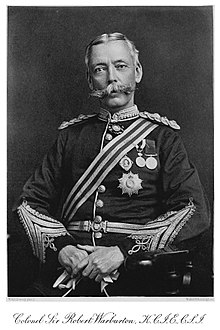Robert Warburton
| Robert Warburton | |
|---|---|
 |
|
| Born |
11 July 1842 A British military fort, Afghanistan |
| Died |
22 April 1899 (age 56) Number 3, Russell Road, Kensington, London, England |
Colonel Sir Robert Warburton, KCIE, CSI (11 July 1842 – 22 April 1899), was an Anglo-Indian soldier and administrator. Half-Afghan and proficient in Pashtu, he served for many years that British political officer in charge of the Khyber Pass, a region of strategic importance to British India. He helped maintain peace with the Afridis who rose in revolt after eighteen years after his retirement.
Warburton was born in a Ghilzai fort between Jagdallak and Mak on 11 July 1842, was the only son of Lt. Col. Robert Warburton (died 10 Nov. 1863), of the Royal Artillery, by Shah Jahan Begum, niece of the Amir Dost Mohammed of Afghanistan. At the time of his birth his mother was flying from the troopers of Sardar Muhammad Akbar Khan, who pursued her for months after the massacre of English at Kabul on 1 November 1841. She was sheltered by her relatives, and finally rejoined her husband on 20 September 1842.
At the close of the Afghan war, Robert and his mother accompanied his father's battery to Sipri, whence they removed to Morar in Gwalior. In 1850, he was placed at school at Mussoorie under Robert North Maddock, where he remained until 1 December 1856. He was then sent to England, and was placed at Kensington Grammar School under G. Frost. Thence he obtained a cadetship, and after one term at the Royal India Military College, Addiscombe, and two at the Royal Military Academy at Woolwich he obtained his commission in the royal regiment of artillery on 18 December 1861. In 1862, he was sent to India and stationed with the 1st battery of the 24th brigade at Fort Govindghar, the fortress of Amritsar. In August 1864, he exchanged into the F battery of the 18th brigade and was stationed at Mian Mir. In 1866, the failure of the Agra and Masterman's bank left him with only his pay to support himself and his mother. To increase his resources he exchanged into the 21st Punjab infantry. This regiment was then under orders for the Abyssinian campaign, and disembarked at Zoula on 1 February 1868. While serving with the transport train he showed great tact in conciliating native feeling and received the thanks of Sir Robert Napier for his services. When he was invalided to England, Napier interested himself in his behalf, and wrote to the lieutenant-governor of the Punjab recommending him for employment on the frontier. On his return to India in April 1869, he was attached as a probationer to the 15th Ludhiana Sikhs, and in July 1870 he was appointed to the Punjab commission as an assistant commissioner to the Peshawar division. At the end of September 1872, he was removed temporarily to the sub-district of Yusafzai and stationed at Hoti-mardan, and in February 1876 he was permanently appointed. Under Sir Pierre Louis Napoleon Cavagnari, he took part in several enterprises against the hill tribes who persisted in raiding British territory, particularly against the Utman Khel in 1878, and was five times complimented by the government of the Punjab and thrice by the secretary of state for India. In 1879, during the Afghan campaign, Cavagnari made repeated applications for his services, but the Punjab government refused to spare him. In July, however, he was appointed political officer of the Khyber, a post which he held for eighteen years.
...
Wikipedia
